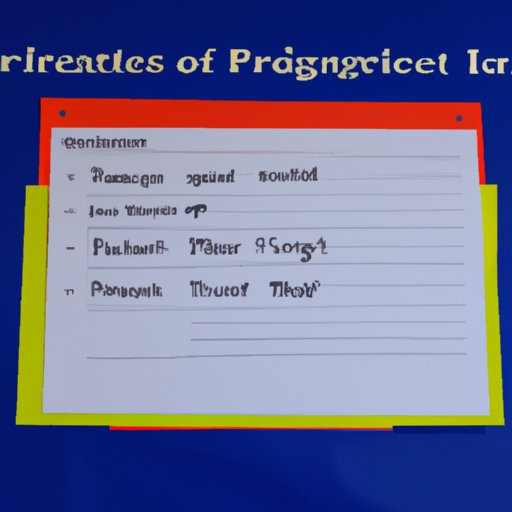Introduction
Directed writing is an educational technique that encourages students to think critically about their writing through targeted exercises and assignments. By using directed writing, teachers can help their students develop the skills needed to become effective writers. This article will explore the definition of directed writing, its benefits, how to utilize it in the classroom, tips and tricks for successful directed writing, and analyzing the impact of directed writing on student performance.
Definition of Directed Writing
Directed writing is a type of writing that focuses on a specific topic or concept. It involves providing students with a set of instructions that guide their writing process. These instructions can include defining the purpose of the writing, the audience for the writing, the structure of the writing, and the criteria for success. Through directed writing, students are encouraged to think critically about their writing, develop their own ideas, and craft a piece of writing that meets the given criteria.
Benefits of Directed Writing
Directed writing has several benefits for both students and teachers. For students, it encourages them to think more deeply about their writing and develop their own creative ideas. It also promotes better organization of ideas and improved time management. Additionally, it helps students build confidence in their writing abilities, which can lead to higher levels of engagement and motivation.
For teachers, directed writing provides a way to assess student understanding of a particular topic or concept. It also allows teachers to provide feedback on student work in a timely manner, which can help to improve student performance. Finally, directed writing can be used as a tool to help students practice and reinforce the skills they need to become successful writers.

How to Utilize Directed Writing in the Classroom
Directed writing can be used in many different ways in the classroom. One way is to assign directed writing exercises and assignments. These can range from short-answer questions to full essays. When assigning directed writing tasks, it is important to provide clear instructions and expectations for the assignment. Additionally, it is important to provide guidance and feedback throughout the writing process.
Another way to use directed writing in the classroom is to incorporate it into other activities. For example, teachers can use directed writing to help students brainstorm ideas for projects, create outlines for papers, or practice editing and revising. Teachers can also use directed writing to help students practice specific writing skills, such as grammar, punctuation, and sentence structure.
Examples of Directed Writing Assignments
Directed writing assignments can take many forms. Here are some examples:
- Write a persuasive essay arguing for or against a particular issue.
- Write a descriptive essay about a place you have visited.
- Write a narrative essay about an event that changed your life.
- Write an argumentative essay about a controversial topic.
- Write a research paper exploring a particular topic.

Tips and Tricks for Successful Directed Writing
Successful directed writing requires students to have clear goals and objectives. Students should make sure they understand the task at hand and the criteria for success. Additionally, students should be aware of any deadlines and manage their time accordingly. Finally, students should regularly assess their progress and identify areas for improvement.

Analyzing the Impact of Directed Writing on Student Performance
Studies have shown that directed writing can have a positive impact on student performance. Research has found that directed writing can lead to improved critical thinking skills, enhanced writing ability, and increased confidence in writing. Additionally, students who engage in directed writing are more likely to complete assignments on time and demonstrate mastery of course material.
Conclusion
Directed writing is a powerful tool for improving student writing skills. By utilizing directed writing exercises and assignments, teachers can help their students develop the skills necessary to become successful writers. Additionally, directed writing can lead to improved critical thinking skills, enhanced writing ability, and increased confidence in writing. As such, directed writing is an effective tool for helping students succeed in the classroom.
(Note: Is this article not meeting your expectations? Do you have knowledge or insights to share? Unlock new opportunities and expand your reach by joining our authors team. Click Registration to join us and share your expertise with our readers.)
